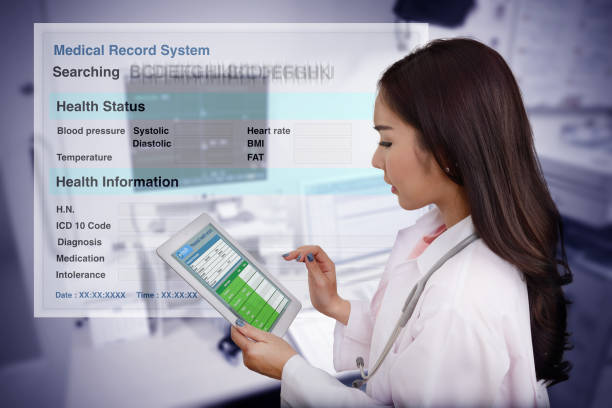Transforming Healthcare: Streamlining Operations, Enhancing Patient Care Through the Wonders of Data Automation
Data Automation in Healthcare: Transforming the Future of Medicine
In the rapidly evolving landscape of healthcare, data automation stands as a pivotal innovation that is reshaping the way medical information is managed, analyzed, and utilized. This paradigm shift is not just a buzzword; it's a revolution that holds the potential to enhance operational efficiency, elevate the quality of patient care, and advance medical research and development. In this comprehensive exploration, we dive deep into the multifaceted realm of data automation in healthcare, unpacking its myriad facets, significance, and real-world implications.
The Evolution of Healthcare Data
Healthcare, like many other sectors, has been undergoing a digital transformation in recent years. Electronic Health Records (EHRs) have replaced traditional paper-based medical records, enabling healthcare providers to access patient data more easily and securely. However, the sheer volume and complexity of healthcare data have grown exponentially, creating challenges in terms of data management, analysis, and utilization. This is where data automation steps in.
What is Data Automation in Healthcare?
Data automation in healthcare refers to the process of using advanced technologies and streamlined workflows to automate various data-related tasks within the healthcare ecosystem. These tasks encompass data entry, data cleaning, data integration, data analysis, and more. The ultimate goal is to reduce the burden of manual labor, minimize errors, and maximize the value extracted from healthcare data.
Streamlining Healthcare Operations
One of the most immediate and impactful benefits of data automation in healthcare is the streamlining of operations. Imagine a busy hospital or clinic where healthcare professionals must juggle a multitude of tasks, from patient care to administrative duties. Data automation alleviates the administrative burden by automating routine tasks such as data entry. Patient information is seamlessly captured and stored electronically, reducing the risk of transcription errors and making information retrieval swift and accurate.
Furthermore, data automation extends to appointment scheduling, billing, and insurance claim processing. These traditionally labor-intensive tasks are now being automated, leading to faster and more efficient healthcare administration. This not only enhances the patient experience but also reduces costs and administrative overhead for healthcare providers.
Enhancing Data Accuracy and Quality
In healthcare, data accuracy is paramount. A small error in a patient's medical record or prescription can have serious consequences. Data automation tools and algorithms are designed to enforce data quality standards rigorously. They can identify and correct inconsistencies or anomalies in medical records, ensuring that healthcare providers have access to accurate and reliable patient information.
Moreover, data automation helps maintain data consistency across different healthcare systems and institutions. Interoperability, the ability of different healthcare systems to communicate and exchange data seamlessly, is a significant challenge in the industry. Data automation plays a crucial role in achieving interoperability by standardizing data formats and facilitating data exchange between disparate systems.
Data-Driven Decision-Making
The healthcare sector generates vast amounts of data every day, ranging from patient records and diagnostic images to clinical trial results and research publications. Harnessing this data for meaningful insights is a daunting task without automation. Data automation tools can swiftly process and analyze large datasets, providing healthcare professionals and researchers with valuable insights into patient trends, treatment efficacy, and disease patterns.
One of the significant advantages of data automation in healthcare is the ability to implement predictive analytics. By analyzing historical patient data, these systems can forecast disease outbreaks, patient readmissions, and even individual patient outcomes. This predictive power enables healthcare providers to take proactive measures, allocate resources efficiently, and improve patient care.
Personalized Medicine and Treatment
The era of one-size-fits-all medicine is gradually giving way to personalized medicine, where treatments are tailored to individual patients based on their genetic makeup, medical history, and specific needs. Data automation plays a pivotal role in this shift. Through automated analysis of genetic data, patient records, and clinical trial results, healthcare providers can identify the most effective treatments for individual patients, minimizing adverse reactions and maximizing positive outcomes.
For example, in oncology, data automation can analyze a patient's genetic profile to determine the most suitable chemotherapy regimen. This not only increases the chances of successful treatment but also reduces the side effects and discomfort experienced by the patient.
Real-World Applications of Data Automation in Healthcare
To truly appreciate the impact of data automation in healthcare, it's essential to examine its real-world applications. Let's delve into a few examples:
1. Electronic Health Records (EHRs): EHRs have become the cornerstone of modern healthcare, and data automation ensures the seamless capture, storage, and retrieval of patient information across healthcare facilities. This accessibility to accurate patient data is especially critical in emergency situations.
2. Medical Imaging: Automation has revolutionized medical imaging, from the digitization of X-rays and MRIs to the use of AI algorithms that can detect anomalies in images with incredible accuracy. This accelerates diagnosis and enables early intervention.
3. Drug Discovery: Pharmaceutical companies leverage data automation to sift through vast datasets of chemical compounds, identify potential drug candidates, and predict their efficacy. This accelerates drug development and reduces costs.
4. Remote Patient Monitoring: Wearable devices equipped with sensors continuously collect patient data, such as heart rate and blood glucose levels. Data automation processes this information, alerting healthcare providers to any concerning trends or deviations in real time.
5. Clinical Trials: The automation of clinical trial data management simplifies the process of collecting, verifying, and analyzing data from multiple research sites, accelerating the pace of medical research.
Challenges and Considerations
While data automation holds immense promise in healthcare, it's not without its challenges and considerations:
1. Data Privacy and Security: With the automation of sensitive patient data, ensuring robust data privacy and security measures is paramount to protect patient confidentiality and comply with regulations such as HIPAA.
2. Integration Complexity: Integrating data automation systems with existing healthcare infrastructure can be complex and costly. Healthcare organizations must carefully plan and execute integration projects.
3. Ethical Considerations: The use of AI and automation in healthcare raises ethical questions, such as how decisions are made based on algorithms and the potential for bias in AI systems.
4. Data Quality Assurance: While data automation can improve data accuracy, it's essential to regularly audit and validate automated processes to ensure they are functioning correctly.
The Future of Healthcare
As we look to the future of healthcare, data automation is poised to play an even more significant role. The integration of AI and machine learning will lead to more sophisticated predictive analytics, early disease detection, and treatment optimization. Patients will experience more personalized care, and healthcare providers will operate with increased efficiency.
Additionally, the sharing of healthcare data across borders will enable global collaboration on medical research and the development of innovative treatments. Telemedicine will become more prevalent and accessible, further enhancing healthcare accessibility, particularly in underserved areas.
In conclusion, data automation in healthcare represents a transformative force that is reshaping the medical landscape. It offers the potential to streamline operations, enhance data accuracy, drive data-driven decision-making, and ultimately improve patient care. However, it also brings forth challenges that must be carefully addressed. As healthcare continues to embrace automation, the industry is on a trajectory toward a future where healthcare is not only more efficient but also more patient-centric and effective than ever before.

